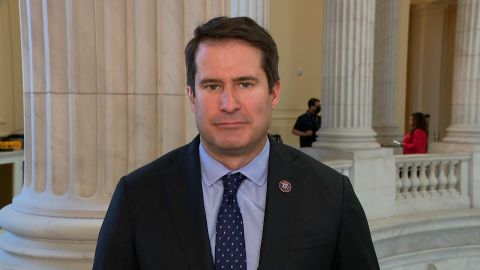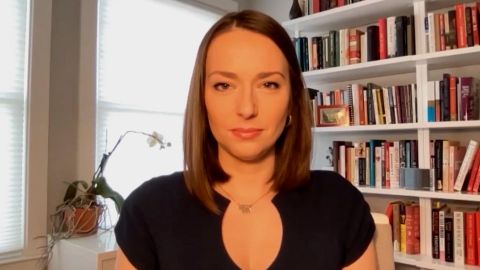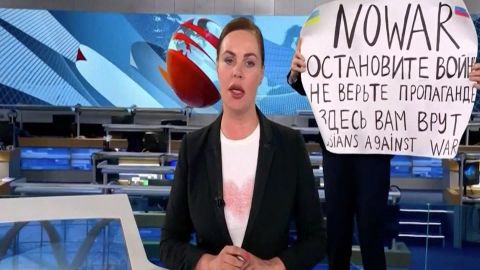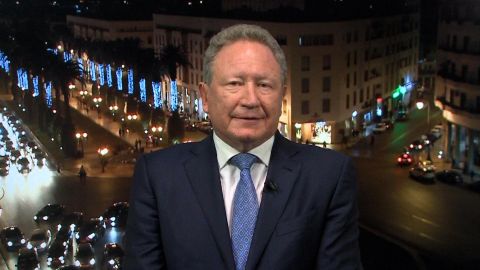Read Transcript EXPAND
CHRISTIANE AMANPOUR: Now, as efforts continue to find diplomatic solutions for the war in Ukraine, President Zelenskyy said today as well that Russia’s negotiating position is “sounding more realistic.” And there’s a similar kind of sounds from Russia about that. A Russian born American journalist, Julia Ioffe, is a founding partner at Puck News and she joins Walter Isaacson to discuss the future of Russia
(BEGIN VIDEO CLIP)
WALTER ISAACSON, HOST: Thank you, Christian. And Julia Ioffe, welcome to the show.
JULIA IOFFE, FOUNDING PARTNER AND WASHING CORRESPONDENT, PUCK NEWS: Thanks for having me, Walter.
ISAACSON: You just interviewed one of the few independent pollsters in Russia who said about two-thirds of the people there support this war. I’m not sure what to believe about what people tell pollsters here or especially in Russia, but, you know, you were born in Russia. You studied in Russia. You speak Russian. Tell me about your sense of the Russian people and what they feel about the war?
IOFFE: It’s very hard to gauge now more than ever because Russia has become kind of a black box with the shutting down of the last vestiges of Russian independent media, and because now people can be fined or go to jail for up to 15 years for even calling this war a war or deviating from the lines about the war set by the Kremlin. So, if it was hard to poll people in Russia before, now, it’s gotten that much harder. You know, especially if you’re polling older people who were born and lived in the Soviet Union and you have somebody from an official sounding organization calling and asking, do you like Vladimir Putin? You know, what are you going to say? The other thing though that’s important to note as Denis Volkov pointed out in our interview, is that Russians support the war that they’re being told about, but it’s not the war that’s actually happening. The war they’re being told about, again, in this informational vacuum is one that is very limited to the East. It’s a liberating these breakaways, these AstroTurf breakaway republics. They’re being told that Russians are being greeted as liberators. They’re being told that there are no casualties, that the Russian army is purposely avoiding targeting Ukrainian civilians, that they’re being extremely careful and kind to them. They’re being told that there are minimal losses in the Russian army. They’re not being told that the Russian army is purposely targeting civilians in this kind of punitive Chechen-Syrian style campaign. They’re not being told that there’s stiff Ukrainian resistance, not just from the military but from the population, that Ukrainians are telling pretty much every Russian soldier they encounter, we didn’t want you here. We didn’t invite you here. And so, I wonder what their impression would be if they knew what was actually going on which is, of course, the point.
ISAACSON: Well, you know, initially, we saw some anti-war protests. Do you think there could be more of these, or is this crackdown effective?
IOFFE: You know, I think the crackdown is pretty effective, at least for now. I think those protests were probably expected by the Kremlin. Again, a lot of them were in St. Petersburg and Moscow. Although, there were some all over the country, but those are two cities who don’t like Putin and don’t like his policies and always protest, have always protested. And, you know, although something like 14,000, 15,000 Russians have been detained in anti-war protests, that’s still out of a country of, you know, 144 million. It’s a drop in the bucket.
ISAACSON: You’ve said that in order to get Russia, to understand Russia, you have to go to the worst-case scenario. What is the worst-case scenario here? Is it biological and chemical weapons? Is it nuclear weapons? Is it mass bombing of populations?
IOFFE: I think it could be all of those things. I think we don’t know. And the worrying thing is that there are so many different worst-case scenarios that are all equally plausible. You know, we currently see the Russian government laying the groundwork. It seems for a false flag chemical attack.
ISAACSON: Yes. Which means that they would claim the Ukrainians did —
IOFFE: Right. They did something similar in Syria, where they carried a lot of water for the Assad regime when it bombed its civilian population with chemical weapons. And they said, oh, it was a Syrian opposition bombing themselves to get sympathy from the West. And now, they’re claiming that Ukraine has all these chemical and biological weapons and that they would bomb themselves to get sympathy from the West and to make Russia look bad. So, it feels like they’re preparing the ground for something. He could use a tactical nuke in Ukraine. Another worst-case scenario is that this goes on like this for months or even years. And Ukraine is just totally flattened and decimated. In Syria, something like half the population was displaced and fled. So, in Ukraine, that would be something like 20 million people, which means, you know, it would be profoundly destabilizing for the rest of Europe.
ISAACSON: You just said something interesting about a false flag chemical or biological attack and that they’re preparing for that. We see even here in the United States some people on real cable TV shows or whatever saying sort of parroting the Russian line that Ukraine has these, you know, weapons labs and they may use them or something. How — is that Russian propaganda? How does that spread that way?
IOFFE: So, that’s a super interesting case, and it is a perfect distillation of how this disinformation system works. So, this claim actually originated on a far-right social media network called GAB. And then, it was picked up further by the right wing. Then picked up by the Kremlin. Then amplified by people like Tucker Carlson and Tulsi Gabbard. Then amplified again by the Kremlin. It’s this ecosystem of, you know, mutual amplification. But it is interesting that it started on an American far right, you know, there’s now a report that indicates to us that this claim started on an American far right social network.
ISAACSON: So, do you think this is just Russian propaganda that they’re able to find willing dupes or something for their propaganda?
IOFFE: I think that’s part of it. I think part of it is that the American far left and American far right are more than happy to, you know, just be against whatever the kind of status quo is or whatever the party in power is saying. For their own ideological reasons, this kind of lines up, and they’re more than happy to ride that horse.
ISAACSON: The great Russian scholar, Steven Kotkin, once said that Stalin, how could one man kill millions of people? And I think his point was, and you can correct, because you took class and I didn’t, I think his point was, no, Stalin couldn’t kill a million people. It took a lot of willing executioners and Russian to follow his orders for that to happen. So, I ask it about this case. Is this Putin’s war, or is this Russia going to war with Ukraine?
IOFFE: I think it’s both. It’s Putin who cooked this crazy up in his head based on profound miscalculations and misreading of the reality on the ground as well as of history. But it’s also Russia’s war in that millions of Russians support it, whatever version of it they’re hearing about. And tens of thousands of Russian soldiers and intelligence operatives are carrying out these orders. They’re pulling the triggers. They’re firing on civilian buildings and infrastructure. At this point, you know, the army knows, right? They’re on the ground. They know what they’re firing on. They know that Ukrainians don’t want them. They know they’re not neo-Nazis, and they continue to execute these orders. So, I think it started with Putin, but he has millions of willing executioners, as we said.
ISAACSON: And so, if Putin were to get deposed or something were to happen to him, is it possible this war continues?
IOFFE: It’s very possible. And there are examples of it in not-too-distant Russian history. Leonid Brezhnev started in Afghanistan, died three years into it, but the war went on for seven more years and was carried on by three of his successors. The Bolsheviks, for example, when they seized power, their stated aim was to get Russia out of World War I. But it took them many months to agree to do so. As the U.S. now knows full well, it’s very easy to start a war, but it’s very, very difficult to end one.
ISAACSON: You wrote a piece titled “Europe 9/11” recently. Let’s start with the title. What did you mean by that title?
IOFFE: This is something that was a quote from European officials. And this was something they were telling officials in the Biden administration, which itself was extremely surprised by how quickly and fiercely Europe rolled out sanctions. And not just sanctions against Russia, but started shipping arms to the — to the Ukrainians. I mean, the fact that Germany did this, the fact that the E.U., for the first time in its history, was shipping weapons to Ukraine. And the way they explained it to American officials was, this is our 9/11. This is a profound cataclysm, and it’s kind of what woken Europe up to the fact that, yes, even after World War II, even after the disillusion, the violent disillusion of the former Yugoslavia, war and land war is still possible in Europe on the European continent.
ISAACSON: In that piece you asked a question, is the idea of an off ramp, in other words, and exit strategy, a way we can get out of this mess, is that a delusion of the ever-optimistic American mind set? So, what is your answer to that question?
IOFFE: I think it is. And the people who talk about an off ramp are offering Putin an off ramp seem to have not been paying attention to the three-month leadup to the war where Putin blew past every off ramp that had been offered to him.\ At this point, I think given his stated aims, which say he will not settle for anything short of the full dismemberment of Ukraine and basically, Ukraine giving up its own sovereignty, it’s hard to see how he climbs back from that and doesn’t lose a lot of face both at home and in the world. And one of his aims in the world has always been to restore Russia’s stature, and his own stature to be seen as the leader of a great superpower. So, how do you still look like the leader of a great superpower if you didn’t achieve any of your stated aims? And that’s where you get back to the worst-case scenario. It’s not just you’re imagining the worst-case scenario in a vacuum, it’s because we know what Putin is like. We know what aims he has stated. He wants to achieve in this war. They are extreme. And it would take a lot more brutality and force and time for him to achieve them if they’re even achievable.
ISAACSON: Is there any way to stop him from continuing to ramp up and become more brutal in pursuit of these aims?
IOFFE: There might be a way to stop him/ But I don’t know that the West is willing to do this. And —
ISAACSON: Explain. Do you mean we would have to send in military?
IOFFE: Yes. But I don’t — I think the West and, you know, NATO, the U.S., are hesitating I think with good reason. Because of direct war with Russia is — you know, can take on a frightening momentum of its own and lead us to horrible, horrible places that we can’t even imagine right now.
ISAACSON: What would happen if Russia just continues this war for the next two or three years, four or five years or indefinitely as it was in Afghanistan and other places? Might they ever subdue Ukraine or is this just a never-ending struggle?
IOFFE: They might subdue Ukraine. It’s happened before. Nikita Khrushchev, one of the ways one cut his teeth in route to becoming general secretary was putting down a violent Ukrainian insurgency in Western Ukraine after World War II, but you know, I think it’s important to note that yesterday was the 11th anniversary outbreak of the civil war. 11 years. That war went on for a very, very long time, and the world moved on, forgot about it, didn’t want to help too much after a certain point. And that could very easily happen here at which point, this turns into a grinding war for several years, or for example, Putin takes Kyiv, manages to install a puppet regime but then has to keep his army there to make sure that the second he withdraws, Ukrainians don’t topple that puppet regime, and that could mean a bloody, violent insurgency that grinds on for years.
ISAACSON: You say this is Europe’s 9/11. If that’s the case, is Biden and the Biden administration, are they not taking this seriously enough? And what should President Biden do when he goes to Europe now?
IOFFE: I think they’re taking it very seriously. They’ve been taking it seriously ever since the buildup started in the fall. And I think they’ve actually done a tremendous job both in rallying allies to impose stiff consequences on Russia, to help the Ukrainians, to keep the eyes of the world focused on this. To work with the Chinese government, to get them to try to get them to peel off from Russia and not support Russia. So, I think they’ve done a tremendous job. I think his task in Europe will be to keep that alliance strong and to make sure that everybody’s still on the same page, because NATO is dozens of different countries. The European union is dozens of different countries with their own prerogatives and priorities. There have always been countries like Hungary, like Italy who are not always willing to go along with things like sanctions against Russia, and keeping them on board, not allowing Putin to divide and conquer is very much on the agenda, and very important to do.
ISAACSON: Do you think that President Biden and his administration can wean China away from it recent closer embrace of Russia?
IOFFE: I don’t know if they can, but they should certainly try. And they should make sure that there are — there would be consequences for supporting Russia. We know now that Russia has asked for military and financial aid from the Chinese government. But it’s much harder with China. China is a massive economy. It has stated that it — that they’re a rival of the U.S. the same way Russia has. Russia is a very small economy. It’s not as — it was before this it was not as integrated into the world economy the way China is. And there’s not that much we can offer the Chinese government in terms of why they should not support Russia.
ISAACSON: Putin recently, in the past year, dismantled Memorial International, the NGO that tries to look at history. Tell me the significance of that.
IOFFE: It is massively and tragically significant. Memorial was the very first NGO founded in the Soviet Union during the prehistoric (ph) era. And it was founded in order to document the crimes of the Soviet Union against its own citizens. Specifically, the great terror that began in the 1930s under Stalin. And it was a way of fighting back against the Soviet regime’s erasure of history and warping of history for political aims. It was a way of documenting what really happened and telling Russians and Soviets at the time what their history actually was. It’s kind of poetic, and I’m sure not totally coincidental that Putin dismantled Memorial, which had also taken on a lot of other functions and fighting for human rights and documenting human rights abuses. That he did this before invading Ukraine. It was one of the only organizations that was honest with Russians about their own history, and was honest and unflinching in documenting it. And in documenting human rights abuses. The fact that we don’t have them now as a voice in Russia is — you know, the silence is deafening.
ISAACSON: Julia Ioffe, thank you so much for joining us.
IOFFE: Thank you.
About This Episode EXPAND
“It was simply impossible to stay silent.” This is the reason given by an editor for Russian state TV for risking everything to speak out against Putin’s war. Seth Moulton discusses Ukraine’s President Zelensky’s speech. Andrew Forrest says the time to stop buying Russian oil and gas is now. Russian-born American journalist Julia Ioffe speaks about the future of Russia.
LEARN MORE



